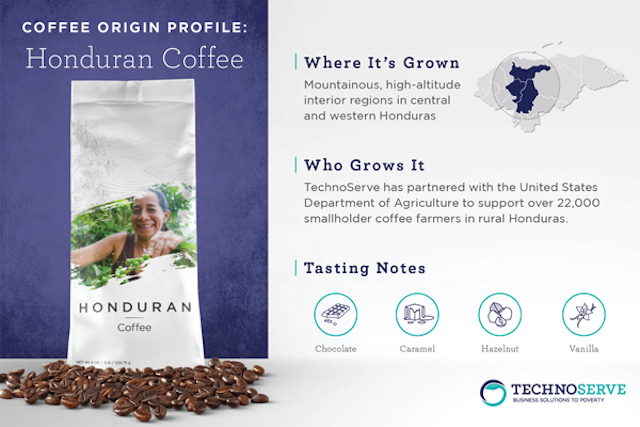Coffee Consumer Spotlight: Honduran Coffee
In the third part of our coffee consumer spotlight series, we are highlighting the unique profile of coffee from Honduras. Through the MAS program, TechnoServe is working to improve the competitiveness of Honduran coffee farmers by offering targeted training and support in all aspects of the coffee value chain.
Where is Honduran Coffee Grown?
Coffee is grown in 15 of the 18 departments in Honduras. However, it flourishes primarily in the mountainous central and western regions of the country, including the departments of El Paraíso, La Paz, Comayagua, and Copán. Historically, Honduras was known for producing low-grade commodity coffee that would be used in coffee blends. However, in recent years, Honduras has become the largest coffee exporter in Central America and one of the top ten coffee producers globally. Honduras now produces some varieties that rival coffee quality in neighboring Guatemala. Coffee is the main agricultural export in Honduras, representing approximately 20 percent of total exports in the country.
The topography of Honduras is extremely mountainous and rugged, with steep slopes and fertile soil. The mountain range that crosses the country from northwest to southeast divides the country into two main regions: eastern and western. Here, coffee flourishes at altitudes above 1,200 meters. Typically, the highest quality coffee is grown at altitudes above 1,350 meters, while the low-grade coffee is grown at lower altitudes. In Honduras, the coffee harvest season runs from November to April.

Who Grows Honduran Coffee?
In Honduras, coffee provides an income for about 120,000 coffee producing families and up to 300,000 rural workers. Over 85 percent of Honduran coffee is grown by small and medium producers, and the sector employs about 1 million people. Through the Sustainable Agricultural Improvement (MAS 2.0) project, TechnoServe is partnering with the United States Department of Agriculture to improve coffee quality and yields for over 22,000 coffee farmers. The program is working to increase coffee productivity by 40 percent in the departments of El Paraíso, Olancho, Francisco Morazán, Comayagua, La Paz, Intibucá, Santa Bárbara, Cortés, and Yoro. In addition to training on agricultural best practices, the program is working to improve access to high-quality materials, working capital, and infrastructure.
Coffee farmers in Honduras face many challenges, including devastating plant diseases and pests, and low prices caused by inefficient marketing channels, especially compared to other Central American countries. In 2013, a severe outbreak of coffee leaf rust, known as “la roya” in Spanish, destroyed almost 30 percent of the coffee farms in the country. There hasn’t been a severe outbreak since, but coffee producers are still dealing with the consequences of the outbreak today. Coffee is also sensitive to the impacts of climate change. Changes in temperature and rainfall in certain regions have reduced the amount of land suitable for growing coffee, with more changes expected in the next 40 years. Low international coffee prices have also led to decreased revenue for farmers who rely on this income for their livelihoods. Despite these challenges, coffee remains one of the few crops adaptable to the mountainous territory. Consequently, it is one of the most promising tools for reducing poverty in Honduras, particularly for people living in those regions.
Tasting Notes
Although the tasting notes of Honduran coffee vary from place to place, most tend to be full-bodied, sweet, and mild. Tasting notes of chocolate, caramel, hazelnut, and vanilla are also often present. Because of this wide variety, it is difficult to identify Honduran coffee in blends. Large coffee roasters often combine Honduran coffee with lower-quality coffees (Robustas) to produce a good blend that can be sold at a reasonable price. The easiest way to purchase coffee from Honduras is by finding a brand that sells single origin coffee from Honduras.
Learn more about TechnoServe’s coffee work.



